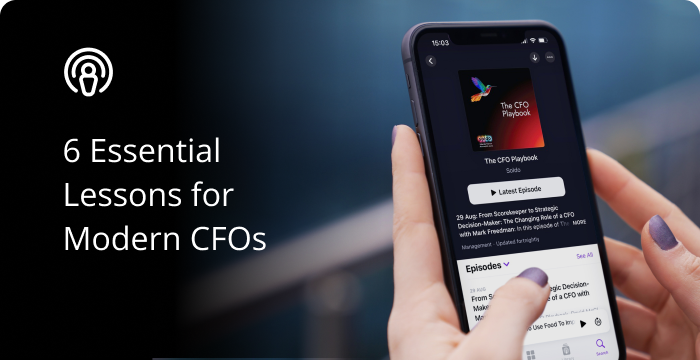Robin Dunbar: Five things companies can learn from evolutionary psychology
Humans, despite all our fancy tech and modern comforts, are primates. We’re complex and blessed with big brains – but we remain animals nonetheless. And according to Robin Dunbar, a leading evolutionary psychologist from the University of Oxford, it’s essential to consider our primal nature when running or building teams.
His research challenges the familiar idea of ‘It’s not personal, it’s just business’. The reality is that’s work is both: It’s personal and it’s business. “The workplace is a social world,” he explains on Soldo’s podcast The CFO Playbook. “And it engages with the wider world by selling products and services.”
In this blog, we summarise five insights from our podcast interview with Professor Robin Dunbar. If you’re interested in hearing more, you can listen to the show here.
Robin Dunbar’s five insights for business:
The view of the accountants
“The last fifty years have been dominated by the view of the accountants. Anything we can count up, profit and loss or dividends for shareholders, that’s what matters.
“What we’re suggesting, however, is that it may not be the most important thing. The numbers are a beneficial by-product if you get the dynamics of the organisation itself right.
“The organisation is a village.”
Non-negotiable constraints
“The underlying social constraints that apply to all monkeys and apes, also apply to us. Just on a bigger scale since we have bigger brains. This manifests in two big ways.
“One is the constraints on the size of the social network we can maintain. Essentially, the number of friends you can have. This is limited across primates by the size of their brains – and in humans, equally so.
“The limit in humans is about 150 people, give or take. So if you get your numbers right in an organisation, it will work better.
“The second part is about how we bond and build trust. The endorphin system of the brain seems to be the main neuro-hormone that underpins long-term bonding. The way we build trust and friendship outside of work applies just as much in work.
“This tends to be activities like eating together, storytelling, singing and dancing. We have a social toolkit, in other words. These are precisely the sorts of measures that are ignored in the boardroom because it’s hard to quantify. But it’s very, very real.
“If you take the time to invest in these sorts of social measures – for instance, making arrangements for communal eating – the productivity will go up for free.”
Optimal efficiency
“Your social world looks like ripples on a pond when you throw a stone in. Imagine you’re the stone, and the ripples running out from you increase in width – meaning more people are included – but the wave height gets lower and lower.
“This implies that the quality of the relationships declines as you go further out. Research tells us that these ‘waves’ come in fairly defined numbers. As I’ve said, the boundary for people that you can have meaningful relationships with is 150.
“What this means for organisations, is that you have to think carefully about numbers on a task-by-task basis. When putting together a group, ask yourself what’s the function and how well the people have to gel for the process to flow efficiently.
“A team that’s designing a specific bit of kit, needs to work together very efficiently without having to constantly stop and explain details. You want a small group and a group that’s on the same page.
“If you want a group to throw ideas around – blue sky thinking – what you need is a diversity of background and experiences. If everyone is on the same page, they’ll come up with the same ideas.”
The homophily effect
“Our abilities to manage relationships are limited. We have a strong preference for people who are similar to us. It’s what’s known as the homophily effect and it’s the single best predictor for whether you’ll be friends with someone or not.
“The homophily effect is an opportunity for organisations to set up a culture, as it were. I’m not talking about putting a mission statement in your foyer – it’s deeper than that. People should have a sense of the organisation’s history and the purpose it serves in the world and the community.
“These become the myth of the organisation. And they become like the totem pole on the village green that everyone can look to and say ‘yeah, we believe in this and this is why we belong together.”
The yearning for community
“Modern life is a lot more insular, and this is driven by the capacity to entertain and socialise at home more easily. You can buy exotic foods and cheap alcohol at the supermarket. Streaming services offer a library of films and TV.
“We don’t need to go out in our community when we’re bored. That’s broken the sense of community. So the question is how do reconstitute the sense of community in modern life? The obvious answer is work. We spend so much of our time there.
“Companies have been spending huge quantities of money on sticking plaster solutions for their peoples’ mental health challenges. But the real solution is obvious and costs a tenth of what you’re investing in consultancies and medical professionals.
“What you need to do, essentially, is find someone good at organising parties. Organising the kinds of social events that people enjoy doing. Those solutions exist, and they’re often very cheap.
“Two activities spring to mind: one is singing. An hour of communal singing turns strangers into friends. And eating together. Having a good quality cafeteria or dining area, where food is subsidised or cheap, will attract people.
“You’ve got to actively work on facilitating social engagement.”
You can listen to the full interview with Professor Robin Dunbar here. Enjoy the show? Be sure to subscribe so you never miss an episode!
Now’s the time to rethink expense management
Almost two-thirds (62%) of employees say reimbursement should be replaced with a system of company cards. Get your copy of The Cost of Business Crisis to find out more.







